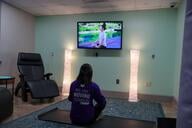You have /5 articles left.
Sign up for a free account or log in.
When the new batch of University of Iowa students comes to campus this fall, one of their first lessons will be a little unexpected: suicide prevention.
All first-year and transfer students will need to complete the new module, which is part of an online course that teaches students information they need to adjust to life there. Students learn how to navigate the grounds and the surrounding city and how to find academic resources, and for the first time next academic year, they will be trained in how to identify suicidal tendencies among their peers.
Administrators said this mandate is the first of its kind for colleges and universities across the country. And it comes at a time when college counseling centers are particularly strapped for resources and more students are reporting and seeking treatment for mental health issues.
Iowa will use a service from Kognito, which creates health-care simulations for many colleges and universities across the country, said Barry A. Schreier, director of the University Counseling Service. It will be folded into Success at Iowa, the online class that freshmen and transfers take in their first year and prior to arriving on campus.
The three-year contract with Kognito cost the university $100,000, Hayley Bruce, a university spokeswoman, said. The University of Iowa Student Government provided $5,000 and the rest was funded through University Housing and Dining.
Kognito's At-Risk program opens with students selecting an avatar. They're presented with situations that involve suicide -- they will need to identify warning signs and work through simulated conversations with people who have suicidal ideations, Schreier said. It takes about 30 to 40 minutes to complete and opens and closes with survey questions about students' attitudes about suicide and other mental health issues. Glenn Albright, the founder of Kognito, said his company has found that students overcome stigmas related to suicide and mental health both for other students and also themselves. He said that students sometimes take longer in the simulation by going back in and "playing" -- selecting the wrong answer and seeing the result, which can also be helpful.
"If there's ever a time in college life to be able to have this training, as a freshman, it's a gift," Albright said.
Kognito has created varying simulations. One is for students, and the others are for the professors and staff at Iowa, he said, which differ depending on their roles -- they’ll be shown the scenarios they would be more likely encounter. Iowa administrators have the goal of training many people on their campus in suicide awareness as possible, Schreier said.
EverFi, another company that creates online trainings for colleges around such subjects as financial literacy and sexual assault prevention, also announced this month that it had partnered with the Jed Foundation to create a new digital course in mental health that includes a suicide-prevention component.
Despite it being required, administrators aren’t punishing students who don’t complete it, he said.
“No desire to tie it into sanctions for not doing it,” Schreier said. “It is being institutionalized because it represents the values of the university to provide this training."
Iowa has used Kognito before, paying for it with a federal grant from the Garrett Lee Smith Memorial Act, named for former U.S. senator Gordon Smith’s son, who ended his life in 2003. Schreier did not say how much the grant was for, only that it had expired. At least 350 institutions use At-Risk, Albright said.
Schreier did not link the introduction of Kognito to any particular incident, saying that Iowa is not immune to suicide deaths.
About three years ago, the university considered adding barriers to parking ramps at the University of Iowa Hospitals and Clinics in response to four suicide attempts. The university started to install the five barriers last September, and two are complete, said University of Iowa Health Care spokesman Tom Moore. Moore said he did not have an estimate for how much the barriers cost. The university and the state attorney general's office settled with a local family for $2.5 million after a patient -- who was not a student -- at the Hospitals and Clinics jumped off a parking ramp in 2014 and later died from her injuries. (Note: This paragraph has been changed from a previous version to add clarity about the timeline of events.)
The university reported in its 2018 National College Health Assessment, a survey from the American College Health Association, that more than 13 percent of undergraduate students had considered suicide in the past year. About 4 percent of the undergraduate population at Iowa had attempted suicide, the university indicated in the report.
Compare this to the student population around the country -- the association’s survey nationwide found that in 2018, a little more than 10 percent of students had attempted suicide (though not in the past 12 months) -- and about 1.5 percent of students had tried in the past year.
In addition to the new students, the university’s resident assistants will also take a course in Kognito, Schreier said. He said the goal isn’t for students to replace professionals, but for them to learn about the warning signs and forward them to the counseling center or another official. He said that of the students who attempt suicide, only a fraction ever talk to counseling center professionals, which means they’re usually going to a peer or friend first. This makes RAs especially, but also the rest of campus the first line of defense, Schreier said.
Lisa Adams Somerlot, director of the counseling center at the University of West Georgia, and past president of the American College Counseling Association, said that administrators “can’t underestimate” the relationships between students when it comes to suicide.
Students often feel more comfortable speaking with an RA first or another peer -- and those student workers are not supposed to handle the situation themselves, merely hand off a person to a professional, Adams Somerlot said. Peer mentorship programs are also flourishing on campuses, she said, filling in the gaps where counselors can’t be.
“I don’t think we can underestimate those relationships,” Adams Somerlot said.




